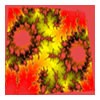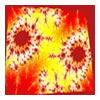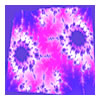 |
||||||||||
Updated: August 9, 2026
Follicular Lymphoma
Phase III Clinical Trial of Single-Agent HuMax-CD20
Seeking Approval on Different Fronts
 In mid-2006 Genmab announced the launch of a second pivotal phase III clinical trial of HuMax-CD20 as a single agent:
this time for treating follicular lymphoma patients who have failed chemoimmunotherapy combinations incorporating
Rituxan or Rituxan given as maintenance therapy. While the trial is interesting in itself as expanding the options
for follicular lymphoma patients, it also serves as another clinical platform to demonstrate the theoretically
superior efficacy of HuMax-CD20 when compared to Rituxan. The results of this clinical trial should be of interest
to CLL patients since approval for the treatment of follicular lymphoma would put HuMax-CD20 in an FDA approval
status similar to that of Rituxan. Read the details in
HuMax-CD20 Monotherapy in Refractory Follicular Lymphoma.
In mid-2006 Genmab announced the launch of a second pivotal phase III clinical trial of HuMax-CD20 as a single agent:
this time for treating follicular lymphoma patients who have failed chemoimmunotherapy combinations incorporating
Rituxan or Rituxan given as maintenance therapy. While the trial is interesting in itself as expanding the options
for follicular lymphoma patients, it also serves as another clinical platform to demonstrate the theoretically
superior efficacy of HuMax-CD20 when compared to Rituxan. The results of this clinical trial should be of interest
to CLL patients since approval for the treatment of follicular lymphoma would put HuMax-CD20 in an FDA approval
status similar to that of Rituxan. Read the details in
HuMax-CD20 Monotherapy in Refractory Follicular Lymphoma.
Chemoimmunotherapy
HuMax-CD20 plus Fludarabine plus Cyclophosphamide
Genmab's New Phase II H+FC Clinical Trial
 Genmab has recently launched a chemoimmunotherapy combination clinical trial involving
its anti-CD20 monoclonal antibody, HuMax-CD20
(generic name ofatumumab). This is a phase II
dose comparison trial. The Genmab protocol combines HuMax-CD20 with fludarabine
and cyclophosphamide over a 6 month treatment cycle. The trial is currently being
offered at four recruitment centers in the United States. There is reason to hope
that HuMax-CD20 will be more effective than Rituxan both as a single agent as well
as in chemoimmunotherapy combinations such as this. You can find our discussion of
this announcement at:
HuMax+FC Announcement.
Genmab has recently launched a chemoimmunotherapy combination clinical trial involving
its anti-CD20 monoclonal antibody, HuMax-CD20
(generic name ofatumumab). This is a phase II
dose comparison trial. The Genmab protocol combines HuMax-CD20 with fludarabine
and cyclophosphamide over a 6 month treatment cycle. The trial is currently being
offered at four recruitment centers in the United States. There is reason to hope
that HuMax-CD20 will be more effective than Rituxan both as a single agent as well
as in chemoimmunotherapy combinations such as this. You can find our discussion of
this announcement at:
HuMax+FC Announcement.
HuMax-CD20: Risks and Rewards
Belt, Suspenders and Cummerbund
Get to Know Ofatumumab
 HuMax-CD20 derives part of its improved efficacy from its capacity to work with a patient's complement
system to destroy B-cells. In HuMax-CD20
Risks and Rewards, we examine the potential risks of complement depletion that may accompany intensive
treatment with this monoclonal antibody — and suggest a possible precautionary measure for those who
are taking part in the Phase III trial of this agent for fludarabine- and Campath-refractory patients.
HuMax-CD20 derives part of its improved efficacy from its capacity to work with a patient's complement
system to destroy B-cells. In HuMax-CD20
Risks and Rewards, we examine the potential risks of complement depletion that may accompany intensive
treatment with this monoclonal antibody — and suggest a possible precautionary measure for those who
are taking part in the Phase III trial of this agent for fludarabine- and Campath-refractory patients.
HuMax-CD20
A Smarter Monoclonal on Trial
What Makes HuMax-CD20 Different from Rituxan?
 In this article we take a closer look at the new agent starring in Genmab's recently announced Phase III
clinical trial for fludarabine and Campath refractory CLL patients. This well-designed trial keys in on
HuMax-CD20's strengths which we hope will provide significantly better results than singe-agent Rituxan,
especially in this difficult patient cohort. To learn more about this pivotal trial and to understand how
this important new monoclonal antibody works, read
A Smarter Monoclonal on Trial.
In this article we take a closer look at the new agent starring in Genmab's recently announced Phase III
clinical trial for fludarabine and Campath refractory CLL patients. This well-designed trial keys in on
HuMax-CD20's strengths which we hope will provide significantly better results than singe-agent Rituxan,
especially in this difficult patient cohort. To learn more about this pivotal trial and to understand how
this important new monoclonal antibody works, read
A Smarter Monoclonal on Trial.
Genmab in the News
HuMax-CD20 in Action
Harvey is Back!
 We have an opportunity to see HuMax-CD20 in action when Harvey and Serena pack their bags and travel to
England in pursuit of therapy with this new agent. To learn more, read:
Genmab in the News.
We have an opportunity to see HuMax-CD20 in action when Harvey and Serena pack their bags and travel to
England in pursuit of therapy with this new agent. To learn more, read:
Genmab in the News.
HuMax Clinical Trial
Early Results from GenMab's Anti-CD20 Monoclonal Antibody
The Half-Full Glass
 We have high hopes for the new generation of monoclonal antibodies
that are under development and have discussed new trials under
way to test these agents in the clinic. Early results form one
such trial, involving GenMab's HuMax, were highlighted at the
2005 ASH conference in Atlanta. We offer our analysis of the
published results in Results from
GenMab's HuMax Clinical Trial.
We have high hopes for the new generation of monoclonal antibodies
that are under development and have discussed new trials under
way to test these agents in the clinic. Early results form one
such trial, involving GenMab's HuMax, were highlighted at the
2005 ASH conference in Atlanta. We offer our analysis of the
published results in Results from
GenMab's HuMax Clinical Trial.
Monoclonal Antibodies
Sons of Rituxan and Campath
A New Generation of More Effective Antibodies Makes It into the Clinic
 The monoclonal antibodies Rituxan and Campath have changed
the landscape for CLL and a whole range of hematological
conditions. New improved versions of these monoclonal
antibodies are now coming out of the lab and into the
clinic. In our article
Sons of Rituxan and Campath, we examine the mechanisms
by which these agents achieve their effects - and the
methods for increasing their efficacy. Read about a new
CD20 monoclonal antibody, HuMax from GenMab, now in clinical
trials in Europe and in the US and, incidentally, satisfy
your curiosity about why we have a picture of a lobster
gracing this paragraph.
The monoclonal antibodies Rituxan and Campath have changed
the landscape for CLL and a whole range of hematological
conditions. New improved versions of these monoclonal
antibodies are now coming out of the lab and into the
clinic. In our article
Sons of Rituxan and Campath, we examine the mechanisms
by which these agents achieve their effects - and the
methods for increasing their efficacy. Read about a new
CD20 monoclonal antibody, HuMax from GenMab, now in clinical
trials in Europe and in the US and, incidentally, satisfy
your curiosity about why we have a picture of a lobster
gracing this paragraph.
 Enter Keywords: |
———
Disclaimer: The content of this website is intended for information only and is NOT meant to be medical advice. Please be sure to consult and follow the advice of your doctors on all medical matters.
Copyright Notice:
Copyright © 2026-2007 CLL Topics, Inc. All Rights Reserved.
All materials contained on this site are protected by United States copyright law and may not be reproduced, distributed, transmitted, displayed, published or broadcast without the prior written permission of CLL Topics, Inc. You may not alter or remove any trademark, copyright or other notice from copies of the content.
However, you may download and print material from CLLTopics.org exclusively for your personal, noncommercial use.
———
